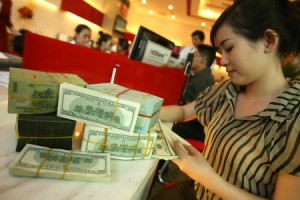The money
The currency of Vietnam is the dong, which is abbreviated to ‘vnd’ or ‘d’. Small denominations include VND 200; 500; 1000; 2000; 5000 in both coin and paper notes. Bigger denominations include polymer notes of VND 10,000; 20,000; 50,000; 100,000; 200,000; 500,000 with Ho Chi Minh’s picture is on every banknote.
The interesting thing when you are in Vietnam and change your money is that you suddenly find yourself VND millionaire.
The Dong value is rather low in comparison to other currency and exchange rate now is around 20,000 to 21,000 vnd to 1 USD.
Since the banknotes bear many digits and the color of some notes roughly the same, it is advisable to check the face of the note carefully before handling for your deal since it might cause confusing and misunderstanding.
Currency use
Vietnam dong is the first and theoretically the only official currency for any common transaction in the country. According to government regulation, all prices for services and commodities must be in quoted in VND; foreign currencies can be only dealt through authorized exchange bureaus or with special permission.
In fact, USD is considered second currency in tourist places and with commonness of EUR, AUD, BP… goes on respectively.
Places like restaurants, bars, travel agencies or souvenir shops in tourist places sometimes accept both USD and VND and price might be quoted in both type of currency so, the best solution is to carry both of them.
Out of tourist sites or in remote areas, only Vietnam dong is accepted.
Remember to stock up enough small bills for your petty deals when you around.
It’s a good idea to check that any bills you take do not have any tears or look too tatty, as shops and restaurants will not accept them.
Also try not to change too much money at one time, as you will end up with a large wad of notes. The largest denomination is currently 500,000 dong and some notes look only slightly different but the value is a big gap. Keep big notes separate from other smaller notes to avoid confusion then.
Exchange money
The exchange rate is rather fluctuant due to inflation or other effects include government regulation that issued unmethodically at time. Recently, the exchange rate for 1 USD is around 20,500 to 21,000 d.
In theory, you can only exchange your money at banks and government authorized exchange bureaus and any transaction out of those places are considered illegal but the practice is not really strict.
Before, the black market operates quite openly but recently that type of business has been cracked down by government authority.
Please, note that exchange money on streets is vulnerable to get risk. Fake money or cut of amount is rather common in this case. If someone approaches you on the street with offer to change money at the better rate you can have at a bank then it is most likely a trap being set for you.
Most of major currencies can be exchanged at banks in Vietnam that nowadays available with offices and branches everywhere in towns and cities and the rate offer among them are roughly the same.
According to regulation, you can not take dong out of Vietnam but you can reconvert reasonable amounts of it into US dollars on departure at land border crossings or airport.
Costs
The cost of travel in Vietnam varies from dirt cheap to sky high. You can live it up with a budget from US$15 to US$250 depending on your level of taste and comfort.
In comparison to many parts of the world, travel in Vietnam in general is quite cheap and reasonable.
Street food is cheap and you can fill your stomach with around US$2 or US$3. A meal in average restaurant costs you around US$5 to US$8 while gourmet restaurants can offer good meal with a dink between US$12 and US$15.
Drinks in bar is quite reasonable with US$1 or US$2 for a beer, cocktail from US$3 to US$6.
If you plan to do good shopping on your holiday then it is the right place. With cheap labor cost, most of the product made in Vietnam is in good price.
Here you can find stuffs from clothes, bronze wares, china wares, wood carvings, paintings and so on with good quality and reasonable price.
Bargaining
Bargaining is essential in most shopping places except super markets and department stores. Remember that in Asia ‘saving face’ is important, so bargaining should be good-natured. Smile and don’t get angry or argue. This is not only for a deal but it is a type of art of living. Bargaining is applied for both locals and tourist without exception.
In some cases you will be able to get a 50% discount or more, at other times this may only be 10%. And once the money is accepted, the deal is done. Don’t be upset if you find someone can get better price than you did; it is about paying the price that is right for you.

